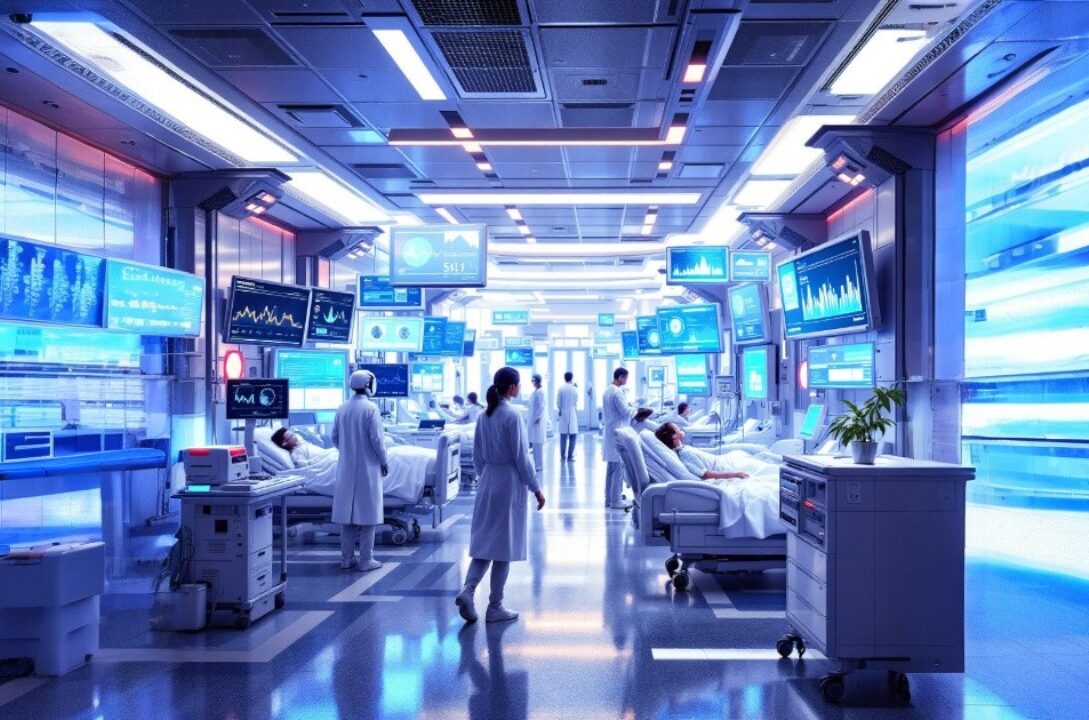Healthcare is on the cusp of a revolutionary transformation, driven by unprecedented advancements in technology and scientific research. This article explores ten surprising innovations poised to reshape the future of healthcare, offering a glimpse into a future where personalized medicine, AI-powered diagnostics, and cutting-edge therapies become the norm.
1. Artificial Intelligence (AI) Revolutionizing Diagnostics
AI is rapidly transforming how we diagnose diseases. Machine learning algorithms are being trained on massive datasets of medical images, patient records, and research literature. This enables AI systems to:
- Detect diseases earlier: AI can identify subtle patterns in medical images, such as X-rays and MRIs, that may be missed by human radiologists. This early detection can significantly improve treatment outcomes for conditions like cancer and cardiovascular disease.
- Personalize treatment plans: AI can analyze a patient’s unique genetic makeup, medical history, and lifestyle factors to predict their individual risk of developing certain diseases and recommend the most effective treatment options.
- Improve the accuracy of diagnoses: AI-powered tools can assist physicians in making more accurate diagnoses by analyzing complex data and providing evidence-based recommendations.
2. The Rise of Telemedicine and Remote Patient Monitoring
Telemedicine, the delivery of healthcare services remotely through technology, is rapidly expanding. This includes:
- Teleconsultations: Virtual doctor visits allow patients to consult with healthcare providers from the comfort of their homes, improving access to care for those in remote areas or with limited mobility.
- Remote patient monitoring: Wearable devices and sensors can continuously monitor a patient’s vital signs, such as heart rate, blood pressure, and blood sugar levels. This data is transmitted to healthcare providers in real-time, allowing for early intervention and proactive management of chronic conditions.
Telemedicine not only enhances patient convenience but also improves healthcare accessibility and efficiency.
3. Gene Editing and Personalized Medicine
Gene editing technologies, such as CRISPR-Cas9, offer the potential to revolutionize the treatment of genetic diseases. By precisely modifying genes, scientists can:
- Correct genetic mutations: Gene editing can potentially correct the underlying genetic defects that cause diseases like cystic fibrosis, Huntington’s disease, and sickle cell anemia.
- Develop personalized therapies: Gene editing can be used to create personalized therapies tailored to an individual’s unique genetic makeup. This approach can improve treatment effectiveness and minimize side effects.
While still in its early stages, gene editing holds immense promise for the future of medicine.
4. 3D Printing in Healthcare
3D printing technology is revolutionizing various aspects of healthcare, including:
- Personalized prosthetics and implants: 3D printing allows for the creation of custom-fit prosthetics and implants that are more comfortable and functional for patients.
- Surgical planning and simulation: 3D-printed models of patient anatomy can be used to plan complex surgeries and simulate procedures, improving surgical outcomes and reducing risks.
- Drug delivery: 3D printing can be used to create personalized drug delivery systems, ensuring that the right amount of medication is delivered to the right location in the body.
3D printing is rapidly becoming an indispensable tool in modern healthcare.
5. The Internet of Things (IoT) in Healthcare
The IoT is connecting medical devices, sensors, and healthcare systems, creating a more integrated and efficient healthcare ecosystem. This includes:
- Smart hospitals: IoT-enabled devices can monitor patient vitals, track medical equipment, and automate tasks, improving patient safety and operational efficiency.
- Wearable technology: Wearable devices can track a patient’s activity levels, sleep patterns, and other health metrics, providing valuable insights into their overall health and well-being.
- Remote care management: IoT devices can enable remote monitoring of patients with chronic conditions, allowing for early detection of potential health problems and timely interventions.
The IoT is transforming healthcare by empowering patients and improving the quality and efficiency of care delivery.
6. Blockchain Technology in Healthcare
Blockchain technology offers several benefits for the healthcare industry, including:
- Enhanced data security and privacy: Blockchain can securely store and share patient data, ensuring data integrity and protecting patient privacy.
- Improved supply chain management: Blockchain can be used to track the movement of pharmaceuticals and medical devices, ensuring their authenticity and preventing counterfeiting.
- Streamlined clinical trials: Blockchain can facilitate the recruitment and management of clinical trial participants, improving the efficiency and transparency of clinical research.
Blockchain has the potential to revolutionize various aspects of the healthcare industry, from data management to supply chain logistics.
7. Nanomedicine: Targeting Diseases at the Molecular Level
Nanomedicine involves the use of nanotechnology to diagnose, treat, and prevent diseases. This includes:
- Targeted drug delivery: Nanomaterials can be used to deliver drugs directly to diseased cells, minimizing side effects and improving treatment efficacy.
- Early disease detection: Nanosensors can detect the presence of disease biomarkers at very early stages, enabling early diagnosis and treatment.
- Tissue engineering: Nanomaterials can be used to create artificial tissues and organs for transplantation.
Nanomedicine holds immense potential for the future of medicine, offering new and innovative approaches to treating a wide range of diseases.
8. Regenerative Medicine: Repairing and Replacing Damaged Tissues
Regenerative medicine focuses on repairing and replacing damaged tissues and organs. This includes:
- Stem cell therapy: Stem cells have the ability to differentiate into various types of cells, making them promising tools for treating a wide range of diseases, including neurological disorders, cardiovascular diseases, and diabetes.
- Tissue engineering: Tissue engineering techniques can be used to grow new tissues and organs in the laboratory, providing potential solutions for organ transplantation.
- Gene therapy: Gene therapy can be used to introduce therapeutic genes into cells, stimulating tissue regeneration and repair.
Regenerative medicine offers hope for the treatment of previously incurable diseases and improving the quality of life for millions of people.
9. Precision Medicine: Tailoring Treatments to Individual Patients
Precision medicine aims to tailor treatments to the individual characteristics of each patient. This approach considers a patient’s unique genetic makeup, lifestyle factors, and environmental exposures to develop the most effective and personalized treatment plans.
Precision medicine has the potential to:
- Improve treatment outcomes: By tailoring treatments to individual patients, we can improve treatment effectiveness and minimize side effects.
- Reduce healthcare costs: By identifying patients who are most likely to benefit from specific treatments, we can avoid unnecessary and costly procedures.
- Advance our understanding of disease: Precision medicine can help us better understand the underlying causes of diseases and identify new therapeutic targets.
Precision medicine is transforming how we approach healthcare, moving towards a more personalized and effective model of care.
10. The Role of Big Data and Analytics in Healthcare
The increasing availability of large datasets in healthcare is driving significant advancements in medical research and clinical practice. Big data analytics can be used to:
- Identify disease outbreaks: By analyzing large datasets of patient data, we can identify and respond to disease outbreaks more quickly and effectively.
- Develop new drugs and treatments: Big data analytics can be used to identify new drug targets and accelerate the drug discovery process.
- Improve healthcare quality and efficiency: By analyzing data on healthcare utilization and outcomes, we can identify areas for improvement in healthcare delivery and reduce healthcare costs.
Big data analytics is playing an increasingly important role in transforming the healthcare landscape.
Conclusion
The future of healthcare is bright, with a multitude of exciting innovations on the horizon. From AI-powered diagnostics and personalized medicine to gene editing and regenerative therapies, these advancements hold immense potential to revolutionize how we prevent, diagnose, and treat diseases. By embracing these innovations and fostering interdisciplinary collaboration, we can create a future where healthcare is more accessible, effective, and personalized than ever before.
FAQs
- What is the role of AI in the future of healthcare?
- AI is poised to revolutionize healthcare by enabling earlier disease detection, personalizing treatment plans, and improving the accuracy of diagnoses.
- How will telemedicine impact healthcare access?
- Telemedicine will significantly improve access to healthcare, particularly for patients in remote areas or with limited mobility.
- What are the ethical considerations of gene editing?
- The ethical implications of gene editing are complex and require careful consideration, including concerns about safety, equity, and the potential for unintended consequences.
- How can blockchain technology improve healthcare data security?
- Blockchain can enhance data security and privacy by providing a secure and immutable record of patient data.
- What are the challenges of implementing precision medicine?
- Implementing precision medicine requires significant investments in data collection, analysis, and infrastructure, as well as addressing ethical and social considerations.
This article provides a glimpse into the exciting future of healthcare, where cutting-edge technologies and scientific breakthroughs are transforming the way we approach medicine and improving the health and well-being of people around the world.















